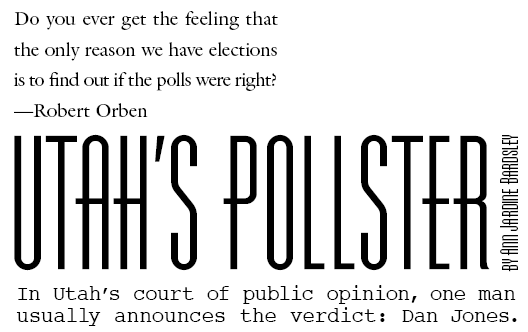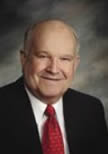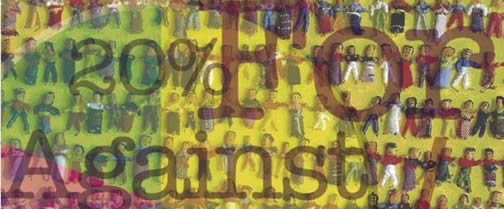
| Vol. 14 No. 2 | Fall
2004 |


SURVEY SAYS
According to a Dan Jones & Associates survey, conducted in June, Utahns* ranked the following as the top national political issues this election season:
1. The
Iraqi War — American casualties and the treatment of prisoners
2. The economy—jobs, inflation, gasoline prices
3. Terrorism—in the United States and abroad
4. Health care—Medicare, Medicaid, prescription drugs, health insurance
for all Americans
5. Crime
6. Illicit drugs
7. Taxes
8. Ethics in government
9. The environment — water, clean air, preservation of wilderness
10. Gay and lesbian rights — same-sex marriage*
Sample
size: 900, with an error margin of plus or minus 3.2 percent.
Public opinion is a hot commodity.
So is pollster Dan Jones.
For 45 years, the University of Utah political science professor/lecturer and co-owner of the market research firm Dan Jones and Associates, Inc. has predicted the winners of every major political race in the Beehive State. This election season will be no different as he and his cadre of writers, questioners, statisticians, field directors, and telephone managers—whom he calls his “rainbow coalition”—conduct public opinion surveys for a variety of clients. Meanwhile, in his political science classes at the U, Jones will, as in other years, informally poll his students. “They’re very accurate,” he reports.
Unlike polling in the 1960s and 1970s, when surveys were administered face-to-face on the street, in shopping malls, and in neighborhoods, today 90 percent of Jones’ polling is conducted over the telephone. Phone numbers are accessed through random-digit dialing, or from the phone book, a database, or a list provided by the client. Because of fax numbers, busy signals, and voice messaging, Jones’ 65 part-time pollsters, two of whom speak Spanish, make 10 to 20 calls before one live person picks up the phone. Once contact is made, the number is discarded until it is randomly selected again.
The nerve center of Dan Jones and Associates, located in Salt Lake City, is its phone bank, a large, florescent-lit room that contains 27 cubicles, with corresponding telephone headsets. Workers place calls between 1 and 9 p.m., when people are most likely to be home. Though respondents remain anonymous, Jones’ pollsters are not allowed to talk about surveys outside of the office so as to maintain a high standard of confidentiality. Even discussing polls within the office is discouraged. “We won’t sell anything and we won’t break confidences,” Jones says.
Carolyn Fleming, who has worked for Dan Jones and Associates for more than five years, explains, “All survey respondents have biases, so questions are written to be as neutral as possible. Each survey is different. There are overnight polls and ones that take months to create. There are city, county, Wasatch Front, statewide, and national polls. Each poll is commissioned, customized, and proprietary,” she says. Surveys can cost as much as $50,000, but most average between $10,000 and $20,000.
Pat Jones, co-owner of Dan Jones and Associates along with her husband of 29 years, explains that polling is based on statistics and mathematical formulas, “pure random samples within a tolerated error margin. When you start breaking down respondents into subgroups according to gender, religion, and geographic area, the margin of error goes way up within the subgroups. So you have to have a huge sample,” says Pat, a U of U communication graduate.
While the firm has conducted public opinion surveys on thousands of topics, including medical research, education, transportation, and abortion—the most “provocative” issue, Jones says—25 percent of Dan Jones and Associates’ business is political polling, which includes campaign, election, and public opinion polls. A member of the Utah State House of Representatives, Pat, a Democrat, notes, “Most of our business is market research—focus groups, branding and marketing, product testing and packaging, but it’s all done the same way. Whether it’s politicians or motor oil, we write and test questions using the same methodology.”
Dan, who currently serves as the interim director of the University’s Hinckley Institute of Politics, has studied the use and misuse of polls and notes, “Public opinion polls can influence voters and the public, but many times they don’t sway an election.” He points to the headline of a May 2004 Utah newspaper article—88% Approve of Walker. “Yet Olene Walker wasn’t elected to represent the Republicans in the gubernatorial race,” he says. “Opinion does not necessarily lead to behavior. The most difficult part of a political poll is predicting voter turnout, which pretty much determines who is going to win. And five percent of voters don’t make up their minds until they are in the booth.”
What polls can affect, according to Jones, is campaign financing. “If candidates are ahead in the polls, it can help them get money. And if they are low in the polls, it can dry up their funds,” he says.
Jones’ political inclination can be traced to his childhood in Pocatello, Idaho, when the family, including Jones and his seven siblings, discussed the politics of the day. He distributed political “door knockers,” debated in high school, and was intrigued by politics and American history. He received his B.A. in political science from Idaho State College, joined the U.S. Army, and ended up at the U, where he later received his M.S. and Ph.D. degrees in political science.
In 1959, at age 25, Jones helped conduct public opinion polls for The Salt Lake Tribune on the Salt Lake City mayoral race between J. Bracken Lee and Bruce Jenkins. Two years later, Jones polled his first national presidential election, between Kennedy and Nixon. “That was the ideal election,” he says, a hint of wistfulness in his gravelly voice. “It was the first televised debate; the candidates stayed on the issues; they were both handsome; and the election was very close. Kennedy won by less than 100,000 votes, but did well in the electoral colleges. I was so excited and so accurate!”
Jones taught political science at Utah State University for 12 years and served as the director of the Bureau of Government and Opinion Research from 1973 to 1980.
Since then Jones has conducted political surveys and consulted for, among others, former governors Scott Matheson, Norman Bangerter, and Mike Leavitt; senators Orrin Hatch, Bob Bennett, and Jake Garn; Congressional representatives Jim Hansen, Chris Cannon, Merrill Cook, and Enid Greene; and former Salt Lake City mayor Deedee Coradini. Since 1982, Dan Jones and Associates, which grosses between $1.4 and $1.6 million annually, has been the official pollster for local NBC affiliate KSL television and Utah’s daily The Deseret Morning News.
“No one knows Utah politics better than Dan Jones,” says political science professor Ron Hrebenar, interim director of the Hinckley Institute of Politics, of his colleague.
Jones, however, is still haunted by the only time one of his polls projected the wrong winner, even though the results were within the five percent margin of error. That was in 1986. Based on exit-poll interviews, Gunn McKay was indicated as the winner of the first congressional district seat. Jim Hansen ended up winning the election. “I still haven’t gotten over it,” Jones says, shaking his head. “But a pollster can never cheat. You have to be absolutely honest, ask very direct questions of a representative sample of the population, and make sure your field research is good. You have to be beyond reproach. That’s how you live with yourself,” he says.
Pat says the reason politicians keep calling is because they know Jones will tell them the truth. “He doesn’t sugarcoat information,” she says, adding that he operates the same way in his personal life. “He comes from a very close family, but all of them get right to the point. They have a very candid sort of style. Some people don’t understand it because most people tell them what they want to hear.”
Dan Jones’ own political persuasion? “I can’t have one if I’m going to poll,” he says. And as for how long he intends to do that, he responds: “I am going to take it one election at a time.”
—Ann
Jardine Bardsley BA’84 is a writer in the University’s public
relations office.
